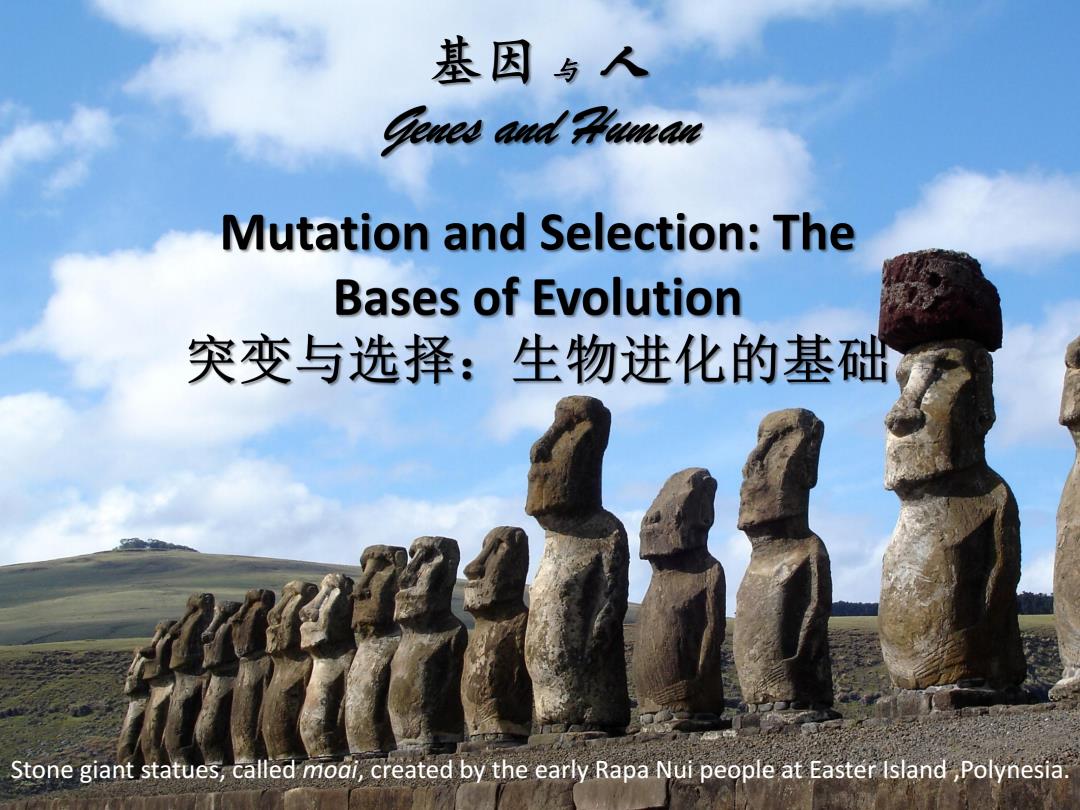
基因与人 genes and Raman Mutation and Selection:The Bases of Evolution 突变与选择:生物进化的基础 Stone giant statues,called moai,created by the early Rapa Nui people at Easter Island Polynesia
Stone giant statues, called moai, created by the e1 arly Rapa Nui people at Easter Island ,Poly1nesia
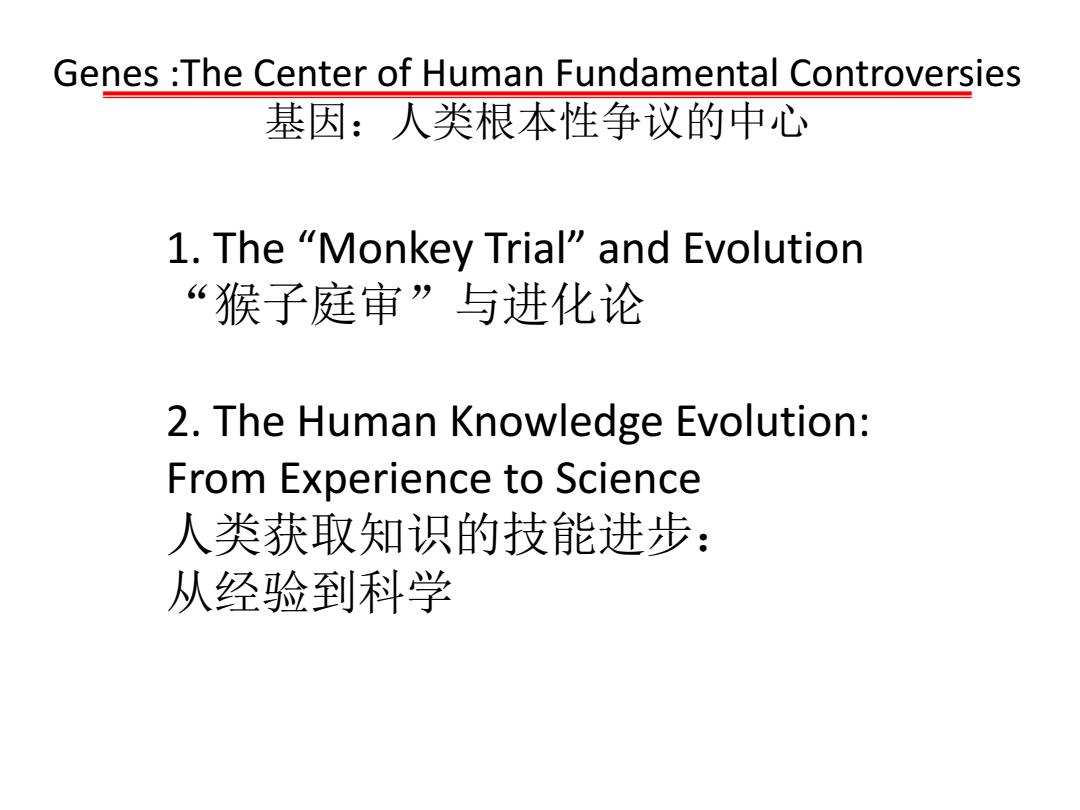
Genes The Center of Human Fundamental Controversies 基因:人类根本性争议的中心 1.The "Monkey Trial"and Evolution “猴子庭审”与进化论 2.The Human Knowledge Evolution: From Experience to Science 人类获取知识的技能进步: 从经验到科学
Genes :The Center of Human Fundamental Controversies 基因:人类根本性争议的中心 1. The “Monkey Trial” and Evolution “猴子庭审”与进化论 2. The Human Knowledge Evolution: From Experience to Science 人类获取知识的技能进步: 从经验到科学
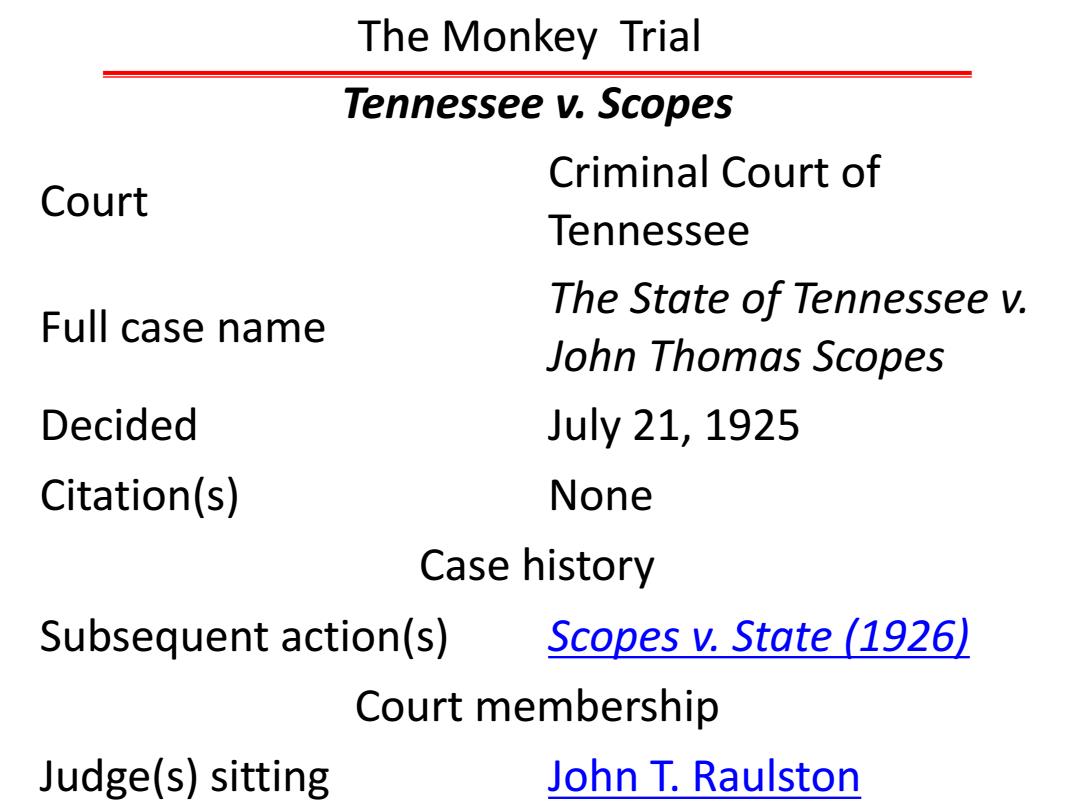
The Monkey Trial Tennessee v.Scopes Criminal Court of Court Tennessee The State of Tennessee v. Full case name John Thomas Scopes Decided July21,1925 Citation(s) None Case history Subsequent action(s) Scopes v.State (1926) Court membership Judge(s)sitting John T.Raulston
Tennessee v. Scopes Court Criminal Court of Tennessee Full case name The State of Tennessee v. John Thomas Scopes Decided July 21, 1925 Citation(s) None Case history Subsequent action(s) Scopes v. State (1926) Court membership Judge(s) sitting John T. Raulston The Monkey Trial
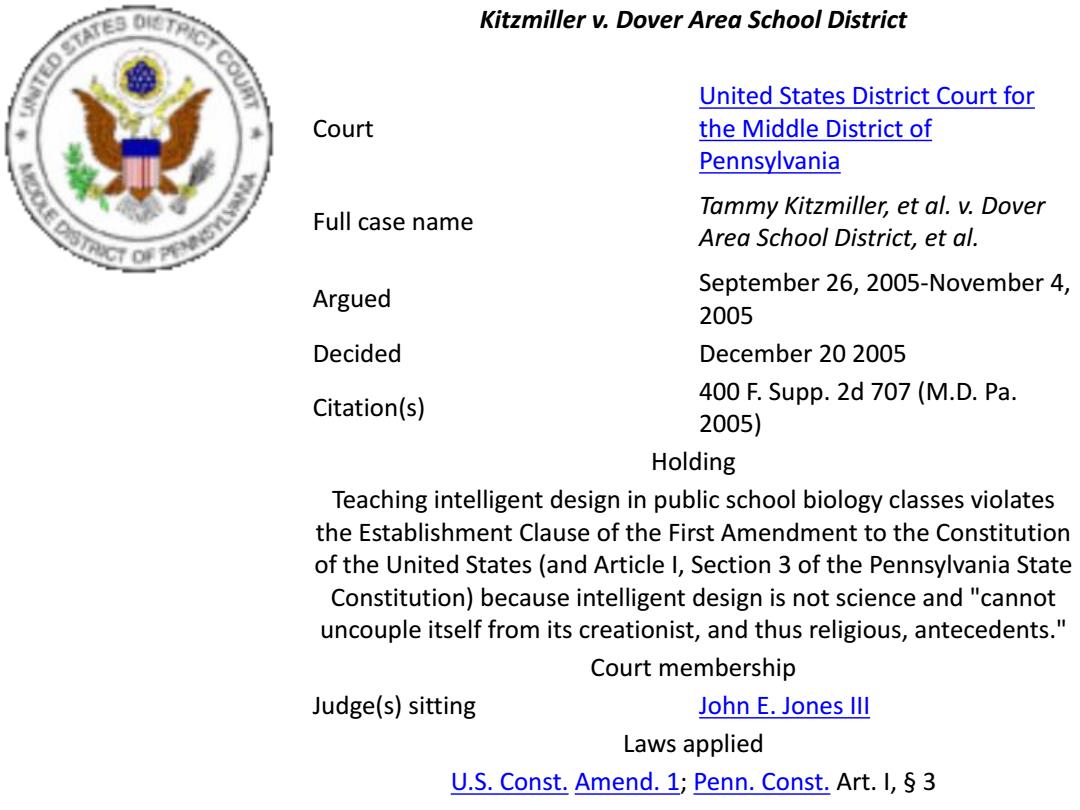
Kitzmiller v.Dover Area School District United States District Court for Court the Middle District of Pennsylvania Full case name Tammy Kitzmiller,et al.v.Dover Area School District,et al. September 26,2005-November 4, Argued 2005 Decided December 20 2005 400 F.Supp.2d 707(M.D.Pa. Citation(s) 2005) Holding Teaching intelligent design in public school biology classes violates the Establishment Clause of the First Amendment to the Constitution of the United States(and Article l,Section 3 of the Pennsylvania State Constitution)because intelligent design is not science and "cannot uncouple itself from its creationist,and thus religious,antecedents." Court membership Judge(s)sitting John E.Jones lll Laws applied U.S.Const.Amend.1;Penn.Const.Art.I,$3
Kitzmiller v. Dover Area School District Court United States District Court for the Middle District of Pennsylvania Full case name Tammy Kitzmiller, et al. v. Dover Area School District, et al. Argued September 26, 2005-November 4, 2005 Decided December 20 2005 Citation(s) 400 F. Supp. 2d 707 (M.D. Pa. 2005) Holding Teaching intelligent design in public school biology classes violates the Establishment Clause of the First Amendment to the Constitution of the United States (and Article I, Section 3 of the Pennsylvania State Constitution) because intelligent design is not science and "cannot uncouple itself from its creationist, and thus religious, antecedents." Court membership Judge(s) sitting John E. Jones III Laws applied U.S. Const. Amend. 1; Penn. Const. Art. I, § 3
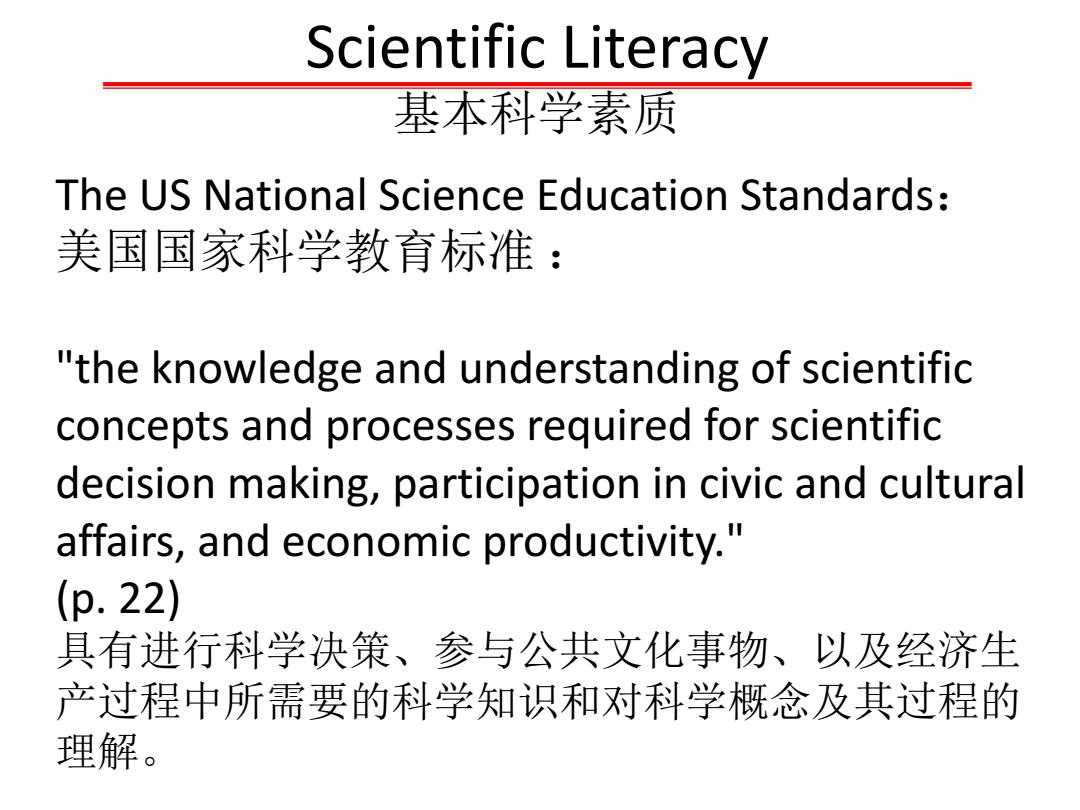
Scientific Literacy 基本科学素质 The US National Science Education Standards: 美国国家科学教育标准: "the knowledge and understanding of scientific concepts and processes required for scientific decision making,participation in civic and cultural affairs,and economic productivity." (p.22) 具有进行科学决策、参与公共文化事物、以及经济生 产过程中所需要的科学知识和对科学概念及其过程的 理解
The US National Science Education Standards: 美国国家科学教育标准 : "the knowledge and understanding of scientific concepts and processes required for scientific decision making, participation in civic and cultural affairs, and economic productivity." (p. 22) 具有进行科学决策、参与公共文化事物、以及经济生 产过程中所需要的科学知识和对科学概念及其过程的 理解。 Scientific Literacy 基本科学素质
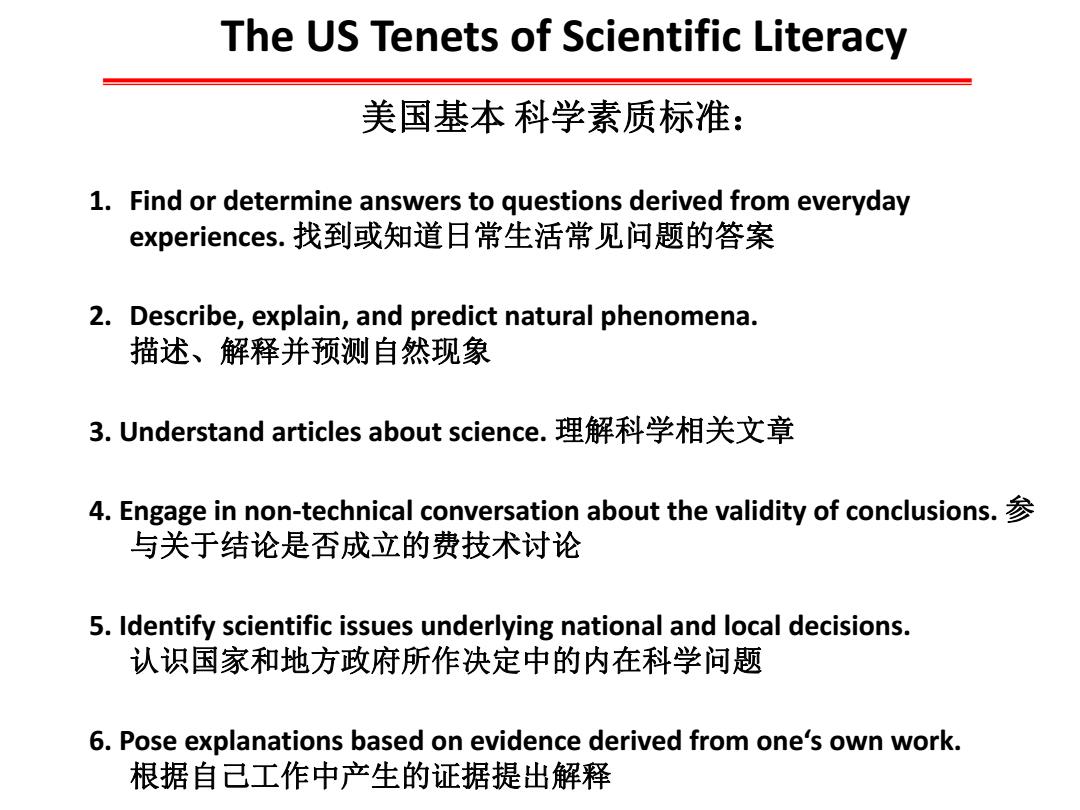
The US Tenets of Scientific Literacy 美国基本科学素质标准: 1.Find or determine answers to questions derived from everyday experiences.找到或知道日常生活常见问题的答案 2. Describe,explain,and predict natural phenomena. 描述、解释并预测自然现象 3.Understand articles about science.理解科学相关文章 4.Engage in non-technical conversation about the validity of conclusions. 与关于结论是否成立的费技术讨论 5.Identify scientific issues underlying national and local decisions. 认识国家和地方政府所作决定中的内在科学问题 6.Pose explanations based on evidence derived from one's own work. 根据自己工作中产生的证据提出解释
The US Tenets of Scientific Literacy 美国基本 科学素质标准: 1. Find or determine answers to questions derived from everyday experiences. 找到或知道日常生活常见问题的答案 2. Describe, explain, and predict natural phenomena. 描述、解释并预测自然现象 3. Understand articles about science. 理解科学相关文章 4. Engage in non-technical conversation about the validity of conclusions. 参 与关于结论是否成立的费技术讨论 5. Identify scientific issues underlying national and local decisions. 认识国家和地方政府所作决定中的内在科学问题 6. Pose explanations based on evidence derived from one‘s own work. 根据自己工作中产生的证据提出解释
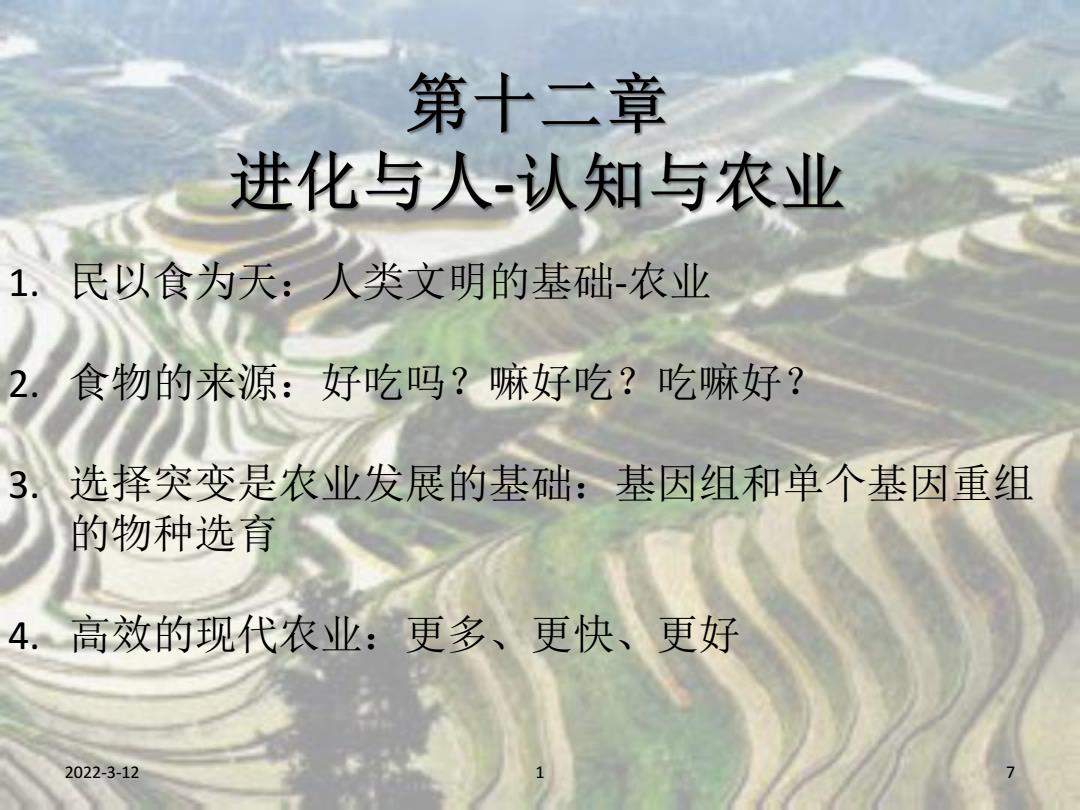
第十二章 进化与人-认知与农业 1.民以食为天:人类文明的基础-农业 2.食物的来源:好吃吗?嘛好吃?吃嘛好? 3. 选择突变是农业发展的基础:基因组和单个基因重组 的物种选育 4.高效的现代农业:更多、更快、更好 2022-3-12
2022-3-12 1 7 1. 民以食为天:人类文明的基础-农业 2. 食物的来源:好吃吗?嘛好吃?吃嘛好? 3. 选择突变是农业发展的基础:基因组和单个基因重组 的物种选育 4. 高效的现代农业:更多、更快、更好
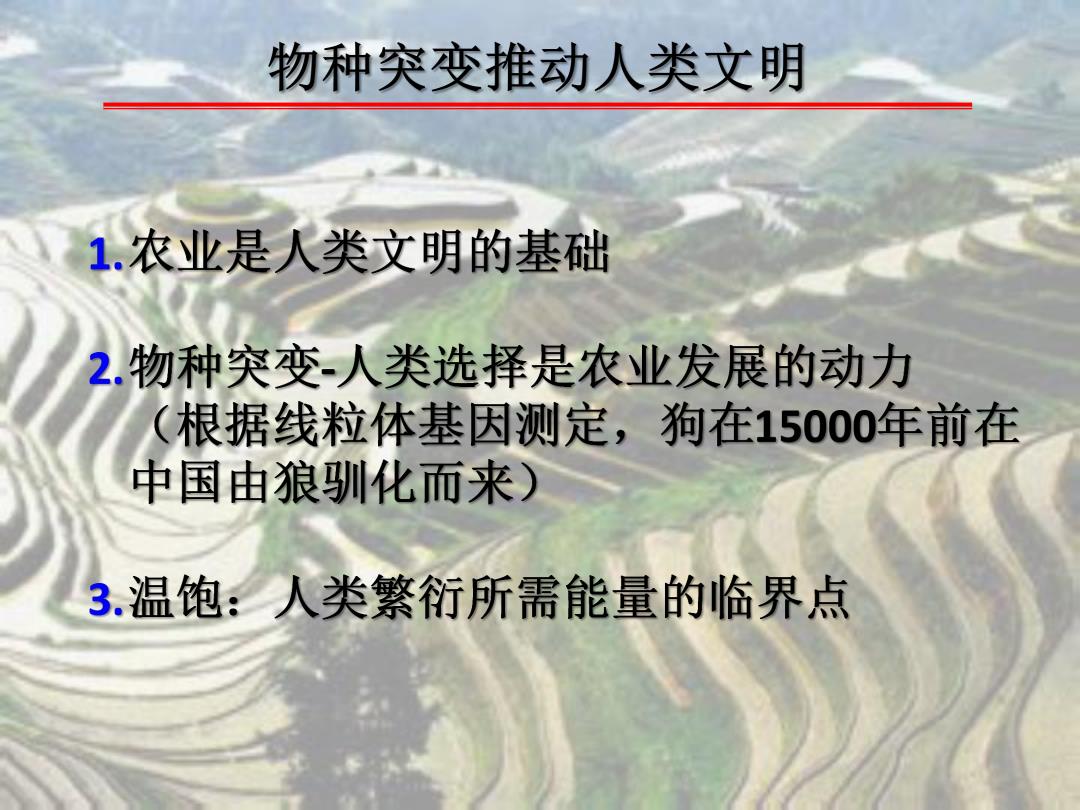
物种突变推动人类文明 1.农业是人类文明的基础 2.物种突变-人类选择是农业发展的动力 (根据线粒体基因测定,狗在15000年前在 中国由狼驯化而来) 3.温饱:人类繁衍所需能量的临界点
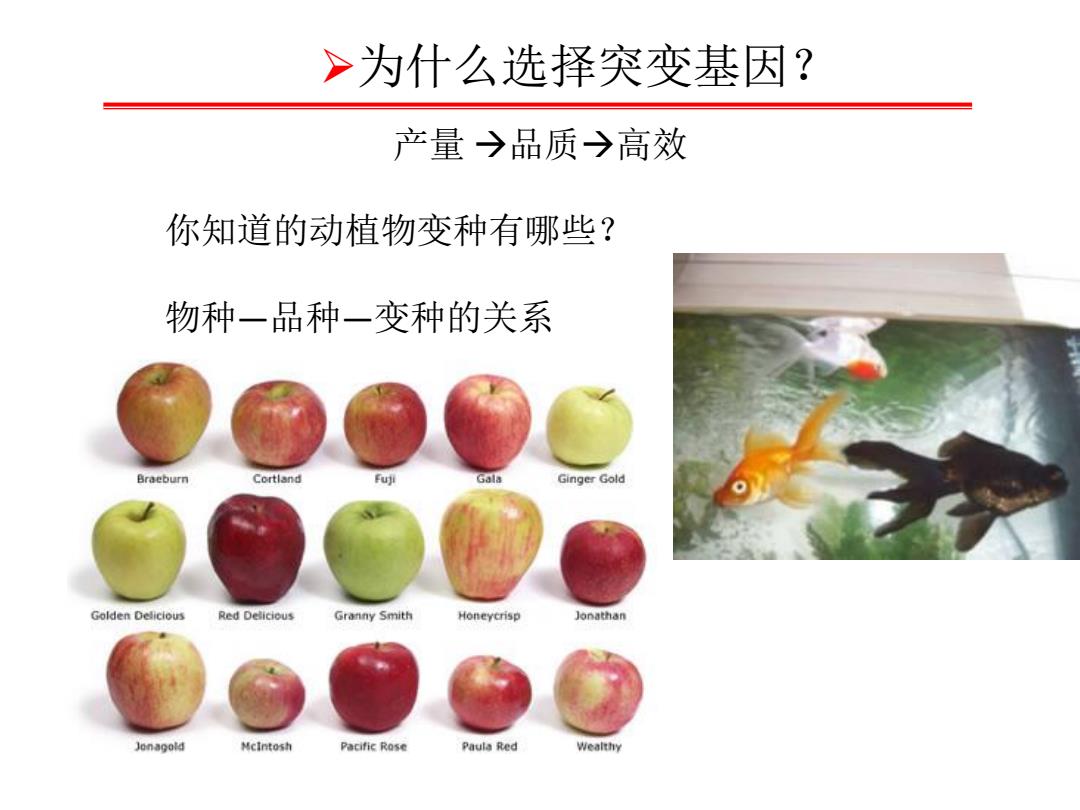
>为什么选择突变基因? 产量→品质→高效 你知道的动植物变种有哪些? 物种一品种一变种的关系 Braeburn Cortland Gala Ginger Gold Golden Delicious Red Delicious Granny Smith Honeycrisp Jonathan Jonagold McIntosh Pacific Rose Paula Red Wealthy
Ø为什么选择突变基因? 你知道的动植物变种有哪些? 物种—品种—变种的关系 产量 品质高效
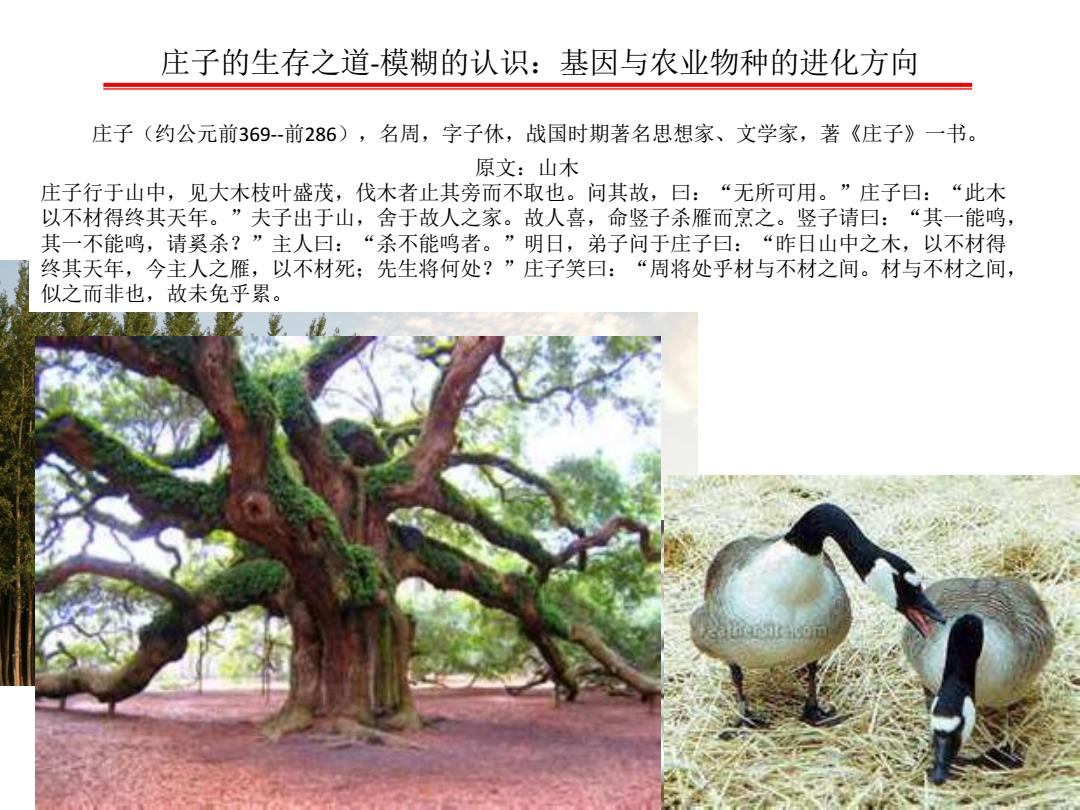
庄子的生存之道-模糊的认识:基因与农业物种的进化方向 庄子(约公元前369-前286),名周,字子休,战国时期著名思想家、文学家,著《庄子》一书。 原文:山木 庄子行于山中,见大木枝叶盛茂,伐木者止其旁而不取也。问其故,曰:“无所可用。”庄子曰:“此木 以不材得终其天年。”夫子出于山,舍于故人之家。故人喜,命竖子杀雁而烹之。竖子请曰:“其一能鸣, 其一不能鸣,请奚杀?”主人曰:“杀不能鸣者。”明日,弟子问于庄子曰:“昨日山中之木,以不材得 终其天年,今主人之雁,以不材死;先生将何处?”庄子笑曰:“周将处乎材与不材之间。材与不材之间, 似之而非也,故未免乎累
现代散养鹅 美国俄勒冈的人工林 庄子(约公元前369--前286),名周,字子休,战国时期著名思想家、文学家,著《庄子》一书。 庄子的生存之道-模糊的认识:基因与农业物种的进化方向 原文:山木 庄子行于山中,见大木枝叶盛茂,伐木者止其旁而不取也。问其故,曰:“无所可用。”庄子曰:“此木 以不材得终其天年。”夫子出于山,舍于故人之家。故人喜,命竖子杀雁而烹之。竖子请曰:“其一能鸣, 其一不能鸣,请奚杀?”主人曰:“杀不能鸣者。”明日,弟子问于庄子曰:“昨日山中之木,以不材得 终其天年,今主人之雁,以不材死;先生将何处?”庄子笑曰:“周将处乎材与不材之间。材与不材之间, 似之而非也,故未免乎累